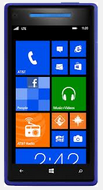 If you visit your local AT&T, Verizon, or Sprint store, you’ll see that most customers are hovering around the iPhones or Android Phones, or maybe around the iPads and Android tablets. What you don’t usually see, are people hanging around the Windows Phone displays at these stores. That’s because for the longest time Windows Phone 8 (WP8) smartphones were thought of as inferior phones. They were usually the bulkiest, shortest battery power, heavy, and just down right non-appealing. But WP8’s have come a very long way with Nokia building and releasing some nice hardware. So, is WP8 ready to compete with iPhones and Android phones?
If you visit your local AT&T, Verizon, or Sprint store, you’ll see that most customers are hovering around the iPhones or Android Phones, or maybe around the iPads and Android tablets. What you don’t usually see, are people hanging around the Windows Phone displays at these stores. That’s because for the longest time Windows Phone 8 (WP8) smartphones were thought of as inferior phones. They were usually the bulkiest, shortest battery power, heavy, and just down right non-appealing. But WP8’s have come a very long way with Nokia building and releasing some nice hardware. So, is WP8 ready to compete with iPhones and Android phones?
I decided to revisit writing apps for WP8 devices again, since I’ve been reading of the renewed enthusiasm in several tech blogs. So I started my investigation by reading forum postings at wpcentral.com, as well as other independent web sites. I also purchased a Nokia 520 smartphone for $90 US off-contract from AT&T to check out the WP8 OS first hand.
I also visited my local Microsoft Store to check out the various WP8 smartphones available. While there, I also examined the new Windows 8 touchscreen laptops. So, here’s my assessment after researching the current state-of-affairs for WP8.
So for some positives, it seems that Nokia has released some very nice hardware for the WP8 phones, and I was suitably impressed. The WP8 OS runs very snappy on the WP8 hardware (even on my low-end Nokia 520). I was able to jump from app to app with virtually little delay. I swiped from one screen to another very smoothly and quickly. If you haven’t seen WP8 in action, the UI has a lot of “fly away” elements when you go to different screens or start up/close apps. This can seem cool at first, but then it became a bit jarring to me coming from an Android phone. But, after a while the visual animations started to grow on me. The OS in general is very nice and fluid, and for some apps very colorful and appealing. But in other cases (like the settings screens) the apps can also seem very plain jane compared to iOS and Android.
For some negatives, I found the lack of a notification center screen bothersome. On my Android device, I can swipe down from the top of my home screen and check my pending notifications. On WP8, you don’t have such a feature. Also, there are no quick toggle switches available that you can quickly turn on/off things like WiFi, Bluetooth, etc. You are forced to go to the main settings screen and drill down to the desired option to change it. Having the ability to lock the screen from auto rotating is also missing from the current release of WP8 (although it should be available in 2014 when the next update is scheduled to be released). These are some examples of small things that Microsoft needs to fix quickly for WP8 to make it a full fledged contender to compete against iOS and Android.
So in general, I felt that the WP8 OS is very usable but still needs some polishing. There’s the issue of WP8 integrating with the Google/iOS/Microsoft online ecosystem, and the smaller number of available apps when compared to iOS and Android (which I’ll discuss later in another posting). I personally won’t switch from my HTC One Android phone to a WP8 phone just yet, but I might at some point in the near future if Microsoft picks up the pace and continues to improve WP8.



 Posted by zunetips
Posted by zunetips
You must be logged in to post a comment.